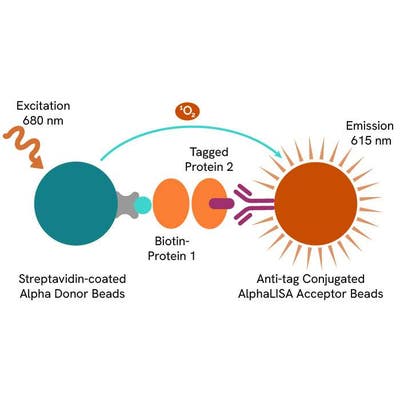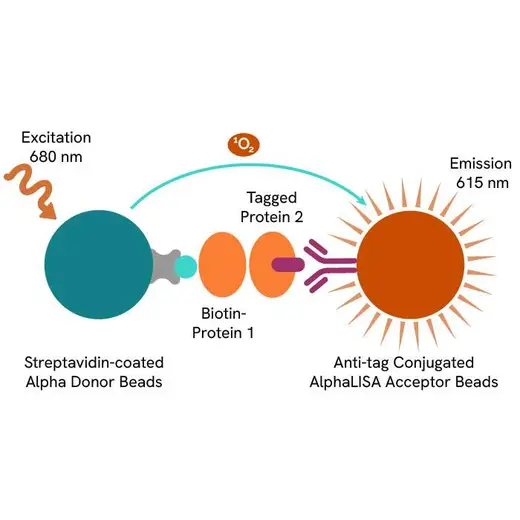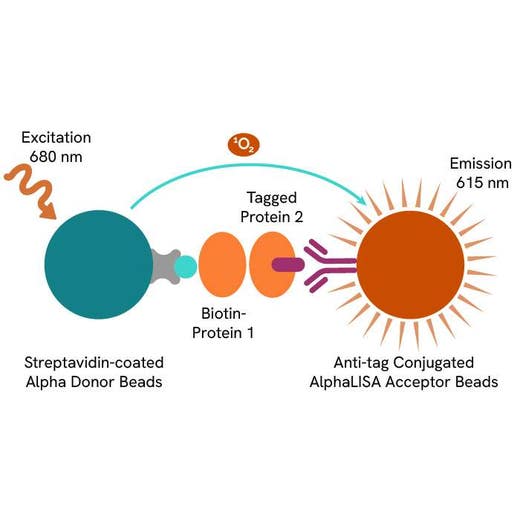
AlphaLISA Mouse PD1 / PDL1 Binding Kit, 5,000 Assay Points


AlphaLISA Mouse PD1 / PDL1 Binding Kit, 5,000 Assay Points






The AlphaLISA™ mouse PD-1/PD-L1 binding assay enables development and characterization of small and large molecule anti-mouse PD-1 or PD-L1 reagents for in vitro and in vivo studies, testing of other putative binding ligands such as PD-L2 or characterization of ligand subregions for their ability to block binding, and determination of mouse cross-reactivity of anti-human PD-1 or PD-L1 reagents using a homogeneous AlphaLISA assay (no wash steps).
For research use only. Not for use in diagnostic procedures. All products to be used in accordance with applicable laws and regulations including without limitation, consumption and disposal requirements under European REACH regulations (EC 1907/2006).
| Feature | Specification |
|---|---|
| Application | Protein-Protein Interaction |
| Sample Volume | 5 µL |
The AlphaLISA™ mouse PD-1/PD-L1 binding assay enables development and characterization of small and large molecule anti-mouse PD-1 or PD-L1 reagents for in vitro and in vivo studies, testing of other putative binding ligands such as PD-L2 or characterization of ligand subregions for their ability to block binding, and determination of mouse cross-reactivity of anti-human PD-1 or PD-L1 reagents using a homogeneous AlphaLISA assay (no wash steps).
For research use only. Not for use in diagnostic procedures. All products to be used in accordance with applicable laws and regulations including without limitation, consumption and disposal requirements under European REACH regulations (EC 1907/2006).



AlphaLISA Mouse PD1 / PDL1 Binding Kit, 5,000 Assay Points



AlphaLISA Mouse PD1 / PDL1 Binding Kit, 5,000 Assay Points



Product information
Overview
Basic immunoregulation studies using human cells can be challenging, whereas options for mouse cells are extensive (immunization of donor mice to generate T cells, T cell receptor transgenic mice). It can often be quicker to learn about immunology and regulation of immune responses by using a mouse system. However, working in mouse systems can often require developing separate mouse reagents if your human drug or antibody won't cross-react with mouse. The AlphaLISA mouse PD-1/PD-L1 binding kit allows determination of cross-reactivity of human anti-PD-1 or PD-L1 reagents with mouse proteins, as well as development or screening of novel mouse PD-1 and PD-L1 reagents that block the binding of this interaction. Using the AlphaLISA mouse PD-1/PD-L1 binding assay, small molecule antagonists or large molecule therapeutics and blocking antibodies can be screened in microplate format. Please note an AlphaLISA human PD-1/PD-L1 binding assay is also available for concurrent studies.
AlphaLISA Binding Assay Features:
- No-wash steps, no separation steps
- ELISA alternative technology
- Sensitive detection
- Broad range of affinities
- High avidity
- Results in less than 3 hours
- Half the time of an ELISA assay
AlphaLISA technology allows the detection of binding interactions in a highly sensitive, quantitative, reproducible and user-friendly mode. In the AlphaLISA assay, a biotinylated mouse PD-L1 binds to the Streptavidin-coated Alpha Donor beads, while His-tagged mouse PD-1 is captured by Anti-6X-His AlphaLISA Acceptor beads. When PD-1 binding to PD-L1 occurs, Donor beads and Acceptor beads come into close proximity. The excitation of the Donor beads provokes the release of singlet oxygen molecules that triggers a cascade of energy transfer in the Acceptor beads, resulting in a sharp peak of light emission at 615 nm.
Specifications
| Application |
Protein-Protein Interaction
|
|---|---|
| Automation Compatible |
Yes
|
| Brand |
AlphaLISA
|
| Detection Modality |
Alpha
|
| Product Group |
Kit
|
| Sample Volume |
5 µL
|
| Shipping Conditions |
Shipped in Blue Ice
|
| Target |
PD-1, PD-L1
|
| Target Class |
Binding Assay
|
| Target Species |
Mouse
|
| Technology |
Alpha
|
| Therapeutic Area |
Immuno-oncology
|
| Unit Size |
5,000 Assay Points
|
Video gallery

AlphaLISA Mouse PD1 / PDL1 Binding Kit, 5,000 Assay Points

AlphaLISA Mouse PD1 / PDL1 Binding Kit, 5,000 Assay Points

Resources
Are you looking for resources, click on the resource type to explore further.
Bispecific antibodies (bsAbs) have emerged as an attractive class of therapeutic agents with the potential to revolutionize the...


How can we help you?
We are here to answer your questions.






























